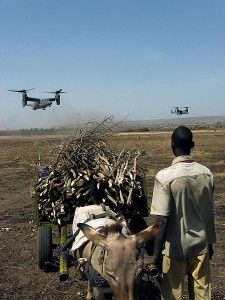 Recently, we have seen violent extremism proliferate across Africa: increased sectarian violence in Nigeria, expanded recruiting efforts by Al Shabaab, and tensions in Mali. A nexus between African political militancy and imported ideological terrorism adds a new dimension to the extremism taking hold in safe havens across Sub-Saharan Africa.
Recently, we have seen violent extremism proliferate across Africa: increased sectarian violence in Nigeria, expanded recruiting efforts by Al Shabaab, and tensions in Mali. A nexus between African political militancy and imported ideological terrorism adds a new dimension to the extremism taking hold in safe havens across Sub-Saharan Africa.
On June 14th, the White House released its Strategy Toward Sub-Saharan Africa, a four-pillar approach that complements AFRICOM’s 2012 posture. While these strategies seek a comprehensive approach, neither accounts for the greatest asset the US has in the region: positive public opinion of US leadership. Additionally, both strategies fail to acknowledge that primary drivers of extremism in Africa are fundamentally political in nature, not economic, and stem from the disenfranchisement of populations.[1]
As violent extremism proliferates across the African continent, the success of US counterterrorism efforts in the Sub-Saharan region could hinge on the US leveraging positive opinions and encouraging the engagement of disenfranchised populations in local and national political processes.
In the past, positive perceptions of US leadership have secured strategic access to the Sub-Saharan region. Bolstering support for US operations ensures a continuity of access. Including local non-military populations – those expected to maintain the security environment in the long-term – in counterterrorism efforts promotes ownership of the results. However, the current US approach is heavily resourced from military capabilities and does not consider the potential of the average citizen in supporting counterterrorism programs.
In 2009, following the election of President Obama, favorable opinions of US leadership in Africa surged to 85% in aggregate. 2011 saw these ratings fall to 74% as part of a global decline in public opinion. While incomparable with the 69% disapproval rating the US received from Pakistan in the same year, the decline is indicative of a less favorable environment in which to court support and participation.
To this end, the US should be challenged to renew its public diplomacy efforts in Africa. By aligning our principles with our actions and clearly articulating counterterrorism objectives, the US can leverage African public support, or at least mitigate backlash from its presence in African affairs. It also presents an opportunity to convey how the average African citizen can play a role in and benefit from securitization efforts, a key factor in managing the regional terror threat.
The US has long championed democracy in Africa, but of the total US$7.8 billion in 2012 bilateral foreign assistance requests, only 5% is intended for programs that support rule of law, civil society, and political competition or consensus building. This is minimal in comparison to 15% for economic development, and 74% for “Investing in People,” which includes the Global Health Initiative.[2], [3] If these development initiatives are to progress, a stable and secure environment must prevail.
By rerouting a portion of development assistance, the US could fund more robust democracy programs in Sub-Saharan Africa. The immediate aim of this restructuring would be to bolster efforts to mitigate disenfranchisement by building democratic frameworks in which all citizens have a voice and stake while simultaneously engaging those previously relegated to the political periphery.
The US has coupled military operations with development initiatives in an approach evident of reactive policymaking rather than proactive strategizing. It is this sort of policymaking that has plagued US ventures in Iraq and Afghanistan, and provoked concerns about our foreign policy aims. In Sub-Saharan Africa, the US has an opportunity to do things differently by being proactive, leveraging public opinion and engaging excluded populations. It would be foolish to squander this opportunity, but it is certainly a road we have been down before.
~
The American Security Project supports US public diplomacy efforts by hosting events and fostering discussions about how American can present itself to the world. We are also hosting a discussion this week with Representative Adam Smith to discuss how US leadership can positively affect Sub-Saharan Africa. We hope you can join us as we bring clarity to this critical issue.
[1] Denoeux, Guilain and Lynn Carter. “Guide to the Drivers of Violent Extremism.” USAID, February 2009.
[2] Congressional Research Service. “U.S. Foreign Assistance to Sub-Saharan Africa: the FY2012 Request.” Report 41840, 20 May 2011.
[3] These values are only reflective of funding administered by the US Department of State and USAID. They do not include humanitarian assistance or aid provided by other agents of the US Government.


